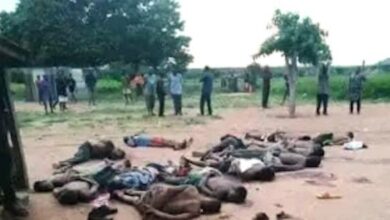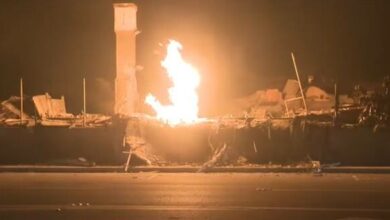In this narrative essay, Zhong Jinhua, a former judge and lawyer in Wenzhou, southeastern China, shares his harrowing experiences as a witness to mass executions, as well as organ harvesting from death row prisoners during his 14-year-long career. Zhong spent five years as a judge in Chinese criminal trials, where he “dealt with death row prisoners almost every day.” His writing has been edited for clarity.
My Story
Whether it be China, America, or anywhere else in the world, serving justice in court and donning a judge’s robes is an honor to which many law practitioners aspire, myself included. With hard work and some luck, I got a position at the Wenzhou Intermediate People’s Court after graduated from law school in July 1994. After serving as a legal clerk in the criminal division at a court of the first instance for over three years, I was appointed judge, a job I would hold for 14 years. In July 2008, I finally had enough and resigned to become a lawyer.
Throughout my 14 years in court, the nine years I spent in the criminal division were the most difficult to forget. I was the legal clerk for three years and then the criminal trial judge for another five years. I dealt with death row prisoners almost every day, and every month I had to witness a bloody execution on site. Here I want to lay bare the memories that haunt my brain, and hopefully, in doing so, banish the nightmare that has for years bedeviled my heart.
At the beginning, when I saw death row prisoners bound, their identities verified, and their sentences carried out, I thought it was simply a matter of punishing the wicked and maintaining justice, which is, after all, a judge’s mission. But as time went on and the number of executions I saw increased, I witnessed some brutal and unimaginably horrifying scenes that shook me to the core. My views gradually shifted. It became increasingly difficult for me to handle it emotionally and I was wracked with nightmares.
The first mental shock came around 1996 to 1997, at the “Snow Mountain” execution ground in Wenzhou. It made a strong impression, for one because it was one of the largest executions by firing squad I have ever seen, with 26 prisoners executed; and because many of them were members of two gangs in my hometown, Wenzhou’s Cangnan County, called the Refrigeration Plant Gang and the Xu Haiou Gang. It was at the height of another “strike hard” crackdown against criminal activities across China, and as an economically developed region in the southeast coast, Wenzhou had to play its part.
On the day of the execution, Snow Mountain was filled with Chinese armed police and public security officers. That afternoon, loads of death row criminals escorted by fully armed police arrived in military and police vehicles from all over the country. The prisoners were then moved to a wall of sandbags, against which they were made to kneel known in a row. Each of the armed police officers had a semi-automatic rifle that had been loaded in advance. They pressed the muzzles of their rifles against the prisoners’ backs, right around the heart.
I was still new to the court, recording minutes at trials, court panel hearings, and executions. It was horrifying to see such scenes for the first time, but remembering the duties entrusted to me by the government, I carefully counted all the prisoners from left to right, then back from right to left — they were 26 in total.
The commander gave the order to shoot, and the air filled with the thunderous report of gunfire. The prisoners fell one after another, their blood splattering everywhere. I began to see stars, and found it hard to stand straight. I rubbed my face and head with my hands in an effort to calm myself. Crematory staff soon came and pulled the bodies away on a flatbed cart.
Serving as a judge, I couldn’t tell whether I was a defender of justice, or simply a murderer made legitimate by the veil of law.
, Chinese judge
The scenes at the execution ground have always reminded me of the anti-Japanese war films that I saw when I was young, where Japanese soldiers gunned down Chinese en masse. It also made me think of the slaughterhouse where butchers threw dead pigs on flatbeds to be carted off. It’s hard to pinpoint the exact sentiment; my heart felt very heavy.
The second memory that made a deep impression on me was an incident with an executioner from the Armed Police. I can’t recall the exact time or place, but it most likely happened after I became a judge.
I’m not sure who is tasked with executing death row prisoners in other regions of China, but here in Wenzhou, it normally is done by the Armed Police at the respective detention center. There were fewer prisoners than the previous time, but not by much. Right when everyone had taken their positions, we noticed that one guy’s arms and legs were trembling terribly. It was probably his first time carrying out an execution. The commander walked straight up to him and ordered him to stop shaking, but he couldn’t help himself. The commander scolded him severely and gave the order to open fire.
But when the shots were fired, the prisoner kneeling right before the trembling armed policeman did not fall. He got up slowly and turned his mud-smeared face to look at him. The guard was so scared that he let out a loud cry and threw his gun up in the air, then began dancing like mad. Everyone was stunned. The commander quickly rushed up to the prisoner, kicked him to the ground, then shot him twice with his handgun. I don’t know what happened to that executioner, whether he was disciplined or if he had mental scars from the incident, but the look of terror on his face will be with me forever.
Once, on a hot summer afternoon, I saw the execution of a female prisoner, a young woman sentenced to death by the Wenzhou Intermediate People’s Court for her involvement in the smuggling of over 200 grams of heroin. The Supreme People’s Court had approved the execution. I remember the whole process because I was tasked with verifying her identity. The drug dealer, clothed in a long white dress, was shrieking and crying desperately all the way from the detention center. She kept calling “heaven” and “mother.” Her two hands, tightly cuffed behind her back, had turned dark purple, and she was shaking uncontrollably. The instant she was made to kneel down, she suddenly let out a piercing scream: “Heaven! Mother! Heaven! Mother!” It was an unbearable thing to witness.
The gunshot rang out, and she in her long white dress fell to the ground and forever stopped crying. The forensic examiner said she was so frightened that she soiled herself.
I couldn’t say anything but was overcome by waves of sorrow. Death penalty, how I loathe you, how hate you!
The fourth incident was an accident involving a lethal injection around 2001 or 2002, also at the Snow Mountain execution site. Lethal injection execution has been an execution method, in addition to shooting, since 1997. It was adopted in Wenzhou around 2001 or 2002. Lethal injection is supposed to be a more humane alternative, reducing the terror that the prisoner feels when facing the firing squad.

In this case, however, not only was the pain and fear not reduced, it was made even more horrible by the executioner’s negligence.
The executioner wasn’t tasked with the prisoner in case I handled, so by regulation it wasn’t necessary for me to be there. But because Wenzhou only recently adopted lethal injection, as chief criminal judges we were encouraged to observe the execution process and familiarize ourselves with the method.
We first arrived at the newly renovated lethal injection observation room, which was connected to the execution chamber. The execution table was already in place, and a few staff clad in white gowns were moving equipment. A male prisoner was brought in. The bailiffs fixed his limbs and his head to different parts of the table and attached different injection equipment to. There were two execution buttons. The prisoner was silent and looked stupefied; he was paralyzed with fear.
The execution was carried out by a bailiff. Everything was in place, and the commander yelled “Ready—Start!” As the bailiff pushed one of the buttons, instead of seeing the prisoner go into the anesthetized sleep as planned, he suddenly began a violent struggle, bawling as though he were being torn limb from limb. Staff and guards tore off the supporting frames and equipment in a flurry, and quickly hauled the struggling prisoner outside. They pinned him to the ground and shot him in the head.
Later we were informed that the executioner had botched the order and mistook the lethal injection button for the anesthesia, leading to the grotesque ending. As a regular judge, I didn’t have any power to change anything, all I had was silence and despair.
In addition to executions, it also shocked me to see doctors opening up prisoners’ bodies to take their organs. I had heard about it before in bits and pieces — the harvesting of organs from death row prisoners for organ transplant surgery was an “open secret” in Chinese government circles and throughout society — but seeing it with my own eyes was a terrible shock.
It was also at the Snow Mountain execution site, though I can’t remember the exact time. It was when we were stilling carrying out the executions by firing squad. After the execution, I hurried to a nearby outhouse to relieve myself. On the way back, I went the wrong direction and entered a small building that was apparently being used as a makeshift operating room. The guy lying on the operating table was the prisoner who had just been shot dead. He was on his back, and there was a large and deep cross shape across his chest, all the way to the stomach. On one side, the abdomen was flipped outwards and hung down from the edge of the operating table as two doctors in white gowns extracted his organs. A strong, sickening odor filled the entire room, and I was so repelled that I was about to vomit. I turned and ran out of the building, then threw up on the grass near the building’s outer wall.
I still feel the urge to vomit whenever I recall that scene. It showed me plainly the existence of that “open secret.” I didn’t know who was responsible for this behind the scenes and who gave them permission. I was completely in the dark on this.
Serving as a judge, I couldn’t tell whether I was a defender of justice, or simply a murderer made legitimate by the veil of law.
In October 2003, I was transferred from the criminal division to the judicial supervisory division as the presiding judge. I stayed on for five years dealing with petitioners, miscarriages of justice, and false charges. In July 2008, I resigned from my position at the Wenzhou Intermediate People’s Court and left the Chinese judiciary for good.
But nightmares continued to haunt me. I often dreamed of being dragged by throng of people to the guillotine. I would wake up, breathless and covered with sweat, at the precise moment when the blade dropped.
The executions took their toll on my colleagues as well. Once, on the way back from the execution grounds, a judge surnamed Zhang passed out and collapsed in a rice paddy.
When I was in China working as a criminal law judge, I opted for lenient punishment in all cases where it was possible to do so. I would fight tooth and nail whenever I had the chance not to give the death sentence. As a result, I offended quite a large number of colleagues and supervisors, but I have always believed that every law practitioner should consider respect for life and liberty as their basic ethical duty. Because everyone only has one life!
About the Author
Zhong Jinhua is an exiled Chinese human rights lawyer, former judge, freelancer.
From August 1994 to July 2008, Zhong Jinhua served at the Wenzhou Intermediate People’s Court in Zhejiang, China, working as the law clerk in the criminal division, presiding judge, and presiding judge for the judicial supervisory division.
From July 2010 to August 2015, Zhong Jinhua worked at the Beijing Yingke Law Firm, Capital Equity Legal Group in their Shanghai law firm and Shanghai Junlan Law Firm as partner and senior partner, respectively.
On New Year’s Eve at the end of 2011, Zhong made a public announcement on his personal Weibo blog calling on Chinese Communist Party (CCP) to lift restrictions on political parties, freedom of the press, and democratic elections. He also declared that he would quit the Party and organize an opposing party to overthrow the CCP’s dictatorship. As a result, he was summoned by Chinese authorities and was threatened with arrest. He was also dismissed by Dong Dongdong, director of the Beijing Yingke Law Firm. He was forced to leave his home for half a month.
During the 709 crackdown in 2015, when hundreds of rights defense lawyers and citizens were arrested, Zhong Jinhua was also harassed and “invited to tea” for advocating on behalf of rural petitioners and rights defense lawyers. On July 13, 2015, Chinese police came to his home with orders to arrest him, but he escaped thanks to outside pressure and support.
On August 11, 2015, Zhong Jinhua took his wife and two children to Shanghai Pudong International Airport. After spending three hours of custody and going through body searches, they were able to board a flight to the United States, where they are living in exile today.
Views expressed in this article are the opinions of the author and do not necessarily reflect the views of The Metro Voice.






